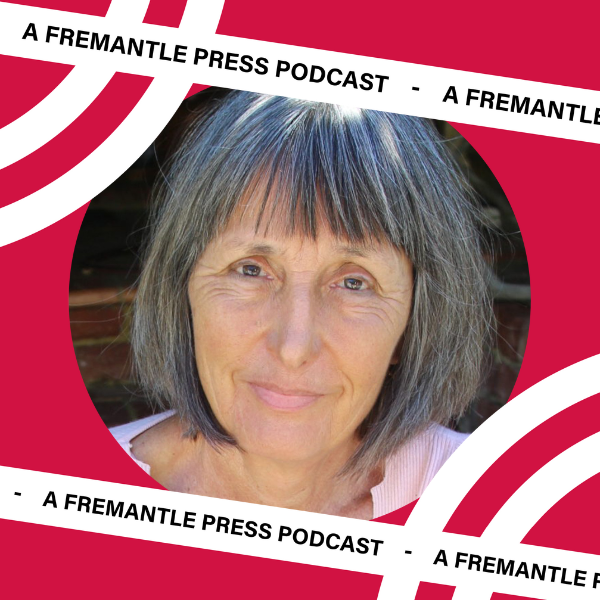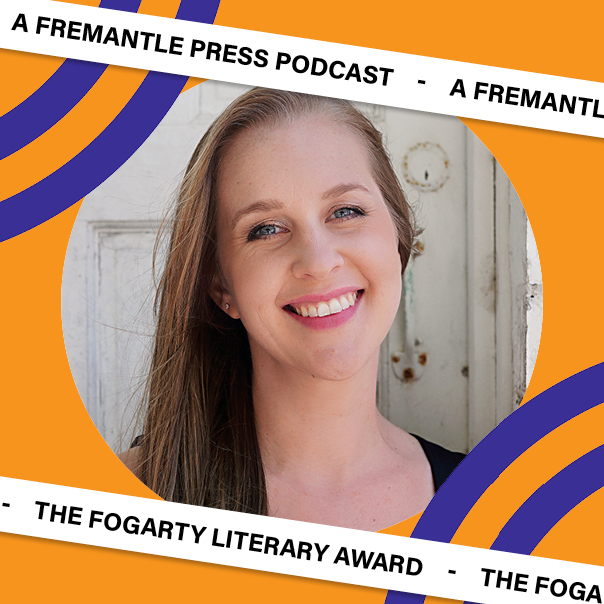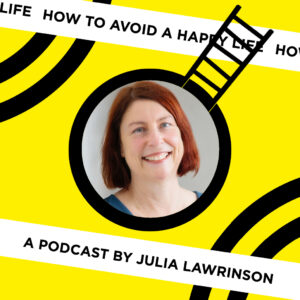Episode Transcript
[00:00:04] Speaker A: Hello and welcome to How To Avoid A Happy Life, the podcast. This podcast is a companion to How To Avoid A Happy Life, a memoir by Julia Laurenson, published by Fremantle Press. But you don't need to have read her story to enjoy the podcast.
This episode was recorded on Whadjuk Noongar Buja and we acknowledge the continuing custodianship of this land and the great storytelling traditions of the Noongar people.
This episode is called Rootlessness.
I'm Danae Gibson and before we start this podcast, I'm going to talk a little bit to Julia about why this topic. Is it just to make me say rootlessness?
[00:00:43] Speaker B: I apologise for that.
[00:00:44] Speaker C: It is very hard to say. It looks fine written down, but as soon as you try and speak it, it's. It's a bit messy.
[00:00:51] Speaker B: This is another of the things that.
[00:00:53] Speaker C: Was in the memoir kind of as background. I think you get a sense when you're read that I'm moving around a lot.
But it was something that I just thought was completely normal until I was well into adulthood and I realised how unusual it was to move around so much. I know that people who have like army parents moved around a lot, but we just moved around because, you know, leases ran out or mum moved in with another boyfriend or whatever, and the impact of it on me didn't really occur to me until much, much later. And so I thought it was something. And I'm not the only one. There are other people who have similarly rootless lives and I thought I'd just reflect on what an impact that can have on you, both good and bad.
[00:01:45] Speaker A: When you were thinking about this, reflecting on it, were you able to find places you'd forgotten you lived in?
[00:01:53] Speaker C: Yes, because I went down and wrote the list of all the houses that I lived in. I couldn't remember the numbers of them, although I would have them written down somewhere. But I just had to go month by month, year by year to remember them. And in fact, it's one of the reasons why I have a reasonably good memory of my childhood, aside from keeping diaries.
I can remember how old I was because of where I was. I can generally remember where I was living. So I can go, I was living in that house, therefore I must have been eleven and a half or something. So it's probably made me remember things more than I otherwise might have.
[00:02:35] Speaker A: How to Avoid A Happy Life the podcast Rootlessness.
[00:02:44] Speaker B: Rootlessness When I was a child, I loved moving house. This was just as well, because my mother and I moved around a lot.
We were never fancy enough to move anywhere interesting. I never changed countries or cities and I only changed schools four times between year one and year 10. But I was always either settling into a rental or preparing to move out of it.
Even before my parents separated when I was nine, we had lived in five houses in four different suburbs all over the metropolitan area.
[00:03:24] Speaker D: White Place, Subiaco Keemor Way, Balga Brookton Highway, Kelmscott Sussex Street, East Victoria Park a different house in Brookton Highway, Kelmscott.
[00:03:36] Speaker B: After I was nine, the moving was confined mostly to the same suburb but now featured the addition or subtraction of new temporary stepfathers.
Between 1979 and when I went into an adolescent psychiatric hospital in 1985, I lived in seven houses and had three different sets of step siblings.
[00:04:01] Speaker D: Duplex 1 Westfield Road, Kelmscott Dean Street, Kelmscott Chesley Court, Kelmscott Duplex 2 Westfield Road, Kelmscott Sussex Street, East Vic Park Grovelands Drive, Kelmscott Clennam Way, Kelmscott When.
[00:04:17] Speaker B: I got out of Hospital in 1986 and when I got pregnant a decade later, not counting stints when I was travelling, I lived in 21 different places in 14 different suburbs.
[00:04:30] Speaker D: Berwick Street, Victoria Park King George Street, Victoria Park Brixey Court, Armadale Carnarvon Crescent, Como Fenton street, Hamilton Hill 2 flats in herdsman Parade Wembley Canning Highway, South Perth Polar Street, Dianella Elizabeth Street, South Perth Hensman street, South Perth McMaster Street, Vic Park Butler Street, Willajie High Street, Fremantle William Street, Highgate Mayfair Street Mount Clermont Jenkins Street, South Fremantle Gold Street, South Fremantle McGann Street, Bayswater Gordon Street, Bayswater Caledonia Nav Maylands I loved the.
[00:05:10] Speaker B: Sense of possibility it brought. Organising a new room, exploring new streets, leaving uncomfortable or difficult things behind. At my last mailing address, the first duplex we moved into after my parents separation was built from dun coloured brick and the previous occupants had grown jasmine over the asbestos fence in an attempt to render the whole front area less ugly than it was.
It was across the road from swamplands that would soon be turned into a housing estate and the narrow backyard held strange kidney shaped ponds made out of concrete. I had hoped to turn these ponds into a water playground in the summer, but the water disappeared into the concrete cracks as soon as it was hosed in.
Its other unusual feature was a service hatch in my room which led into the living room. It had the promise of the motel service hatches I saw when my cousins were in town from Muckamboodin, but my Hopes of being served breakfast through it on a tray were never realised, mostly because we didn't have a tray, and being passed toast and Vegemite through it didn't have quite the same allure.
The hatch opened onto a living room which was bare of furniture but for a table and two chairs.
The radio that was propped on the kitchen bench served as our sole source of entertainment, aside from the American sailors who visited and showed me pictures of Africa and Japan, or the inebriated friends Mum brought back from the Sunday session.
When one lease ended, I often went to a new house or apartment viewings with my mother to find the next vacant place that would become our new home.
I became aware of the looks Mum would get being a single parent with a child looking for a rental. When I was 10, she was refused a two bedroom flat on Albany highway because she had a child. I was outraged. I wasn't a baby. What did they think I was going to do?
Mostly I was at the same school, just arriving from a different route.
This meant that I became daily friends with whoever was up the road and more distant friends with the people, people I might have referred but were now too far to walk to.
We drifted in and out of each other's houses.
Some people had older sisters who thrilled and intimidated me, or older brothers who were either sullen or scary.
Houses with younger brothers and sisters held an air of chaos or the cloying smell of soaking nappies or wet beds.
There were places we learnt to avoid because of yelling parents or because of the annoyance of house proud mothers.
Our favourite houses were the ones where the parents were out and we could dance, roller skate down driveways, make cubbies, steal tampons and experiment with inserting them into each other, or pile things into a 44 kil drum and set fire to them. When I next move, I would leave those daily friends behind for the next cohort of friends. By proximity, I developed an instinct not to pay attention to my physical surroundings. Each house was impermanent, so I became adept at ignoring the wallpaper or the paint on the walls, the state of the flooring or any other feature.
We could not change anything about the houses, even if we wanted to.
Before the advent of Blu Tack, I could not put anything up on my walls, and after Blu Tack, I had to be careful that its oils would not seep into paint or rip wallpaper.
My mother always complained about the filth that each house we rented was left in. How she cleaned the place when we were leaving, only to then have to clean again the place where we were moving into.
She weeded garden beds if there were any, and kept yards with thready dry couch grass, alive if it existed, and ig the dust making sand if it didn't.
But I didn't have to labour in or around the houses, so I ignored all of it. For many years we didn't have television, so I disappeared into the replaying of our limited record collection. Once we purchased a stereo system or lay on my bed rereading the books that comforted me.
It has only ever been other people who have brought me to consciousness of my surroundings.
Some weeks after I was admitted to the adolescent psychiatric hospital, I invited some of the fellow residents to the house I lived in with my mum one weekday, which was currently free of any of her live in boyfriends.
We took a bus and a train and then walked for half an hour on the footpaths glittering with broken glass. By the time we arrived, the other girls were complaining about the distance, how bogan the suburb was. I can't remember why we were visiting, perhaps because we could smoke in peace or just exist unobserved by hospital staff. But I noticed their faces as they took in the old couch, the black and white television, the tobacco smell in the net curtains, the sandy backyard. My mongrel dog who had a skin condition which made him stink.
I put on music, songs I taped from the radio and puzzled over the way they were looking around, seeing something I didn't.
I tried to see the place the way they did, but until I went into their houses later, tastefully decorated places in genteel suburbs, I did not know what it was they were finding fault with. When I was 16, after I got out of hospital, I insisted on moving suburbs. I wanted to start a new life, as if hospital had magically cured me of the emotional instability and self destructive behaviours that had sent me there.
And I had learnt to be ashamed of the suburb I had grown up in because I'd now seen it through the eyes of judging others.
The house we moved into, although close to the city, was in far worse shape than anything in the bogan suburbs we'd left. It had an outdoor toilet full of nesting spiders. It had flimsy locks, so mum affixed her own padlocks because she was so nervous at the drug affected guys who wandered down from the state housing flats nearby.
And there were rats that leapt from the drains if you turned on the tap without giving fair warning and ate everything that you left in the cupboards or on the table, taunting the dog with their swift, bold appearances.
I ignored the state of the house and took to walking the dog down by the Swan river, dreaming of what I would be able to do now that I was away from the location of my past experiences.
The rats gave Mum the motivation to buy her own house for the first time.
This was cause for celebration at first, until Mum decided that in order to savor the deposit, we would be moving in with her sullen, round gutted boyfriend who lived back in the Bogan Subur.
I refused to go with her, so I moved into a flat in Victoria park with at first one and then two former residents of the adolescent psychiatric hospital.
The round gutted boyfriend complained and swore as he helped get Mum's fridge up the stairs to the first floor flat.
I remember the heat of hatred in my chest as he carried on. If he wasn't such an asshole, he wouldn't be put to such inconvenience. Any feelings I had of being abandoned by my mother were left in the heat of my resentment for her boyfriend for the moment, from that first flat at 16 until surprise motherhood a decade later stopped me in my tracks. I kept moving. I was looking for somewhere to feel at home, trying different suburbs and housemates, leaving Perth altogether from time to time, but being drawn back by a sense of homesickness that had no location a associated with it.
One of my university friends relentlessly took the piss out of me because the sole decoration in each of my rented rooms, besides piles of books and guitars in stickered cases, were delicate Japanese prints which I blu tacked to walls. What I would say to her as she exploded into wheezing laughter. She would shake her head, my offence against taste too far gone to merit being packaged into words.
Two decades later, I bought the first place I have ever truly wanted to live. It is near the city, near my friends.
My husband will end up in a secure care facility 10 minutes away. Our daughter goes first to TAFE and then to uni nearby.
Although it has only two bedrooms, I can't really afford it, but I'm prepared to live on baked beans if it means being somewhere I have chosen.
My new partner moves in. We have one dog and then two who we take morning and night to the dog parks nearby.
My uni friend, the one who used to take the piss out of me, visits. She gives me helpful advice now that she understands the cause of my inability to understand the organization of things in a living space.
The thing that surprises her most is that I now have a house full of plants.
There are runners and succulents and dark leaved plants that thrive on low light. I have propagated new plants in glasses of water on the kitchen sill.
Some have grown from clippings I've snipped from the wealthier suburbs across the railway line. Some are there because another green fingered friend has urged me to grow them, but all create a pleasant chaos of greenery.
I love to sit outside in the mornings looking at the shapes of the leaves, the health of the plants, their stages of growth and decline, Jules, the uni friend says after one of her visits, nodding at the array of growing things inside and outside the unit. How do you learn to do that?
How to avoid a happy life. The podcast was produced by Danae Gibson, who has my eternal gratitude, and record recorded at rtrfm. Music was written by Late Night Shopping, Nikki Jones and Sean Salmon. The podcast includes voice work by Nicky Jones and Zoe Warrick. Thank you all for listening.


